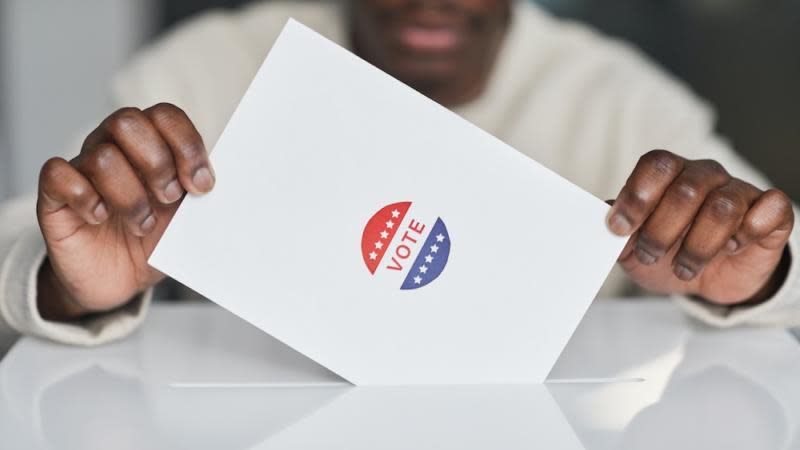Black Americans Don’t Trust Our Institutions, But We’d Do Well To Remember History

- Oops!Something went wrong.Please try again later.
- Oops!Something went wrong.Please try again later.
Black voters have not been turning out at the polls the way they used to.
In the 2022 midterm elections, the Black share of the electorate fell to multi-decade lows. Black voters were a key part of President Biden’s winning coalition in 2020. But, current polling indicates that only 75% of Black voters would vote if the presidential election were held today. That leaves a concerning percentage of Black voters who may not cast their ballots in November 2024.
Black America’s disillusionment with democracy is understandable. It has been four years since the murder of George Floyd prompted a global reckoning of race. Yet, racism appears to be on the upswing. Diversity and equity are no longer universal aspirations but are treated more like dirty words and bad deeds.
History teaches that we disengage from political institutions at our peril. Effecting change at the ballot box may be slow, but it is a major tool we have to hold policymakers accountable to advance change.
Consider the history of Dr. Martin Luther King, Jr. and the Civil Rights Movement. King may be best known for his civil disobedience against oppressive state governments that enforced segregation, but he firmly believed in the capacity of American political institutions to facilitate democracy — to translate the people’s voices into action. King was also concerned with the willpower of political elites to enact policies and effective societal changes.
Specifically, King recognized that the enforcement powers of the American presidency could be a powerful tool for institutionalizing racial equality. In February 1961, he outlined how the executive branch could use its authority to assist in the civil rights struggle, calling on President Kennedy to use executive orders to combat discrimination.
Just one month later, the President issued Executive Order 10925, which prohibited federal contractors from racial discrimination in hiring.
The Order’s efficacy was limited by institutional roadblocks. Absent major legislation, the federal government only had the authority to outlaw hiring discrimination among companies it directly contracted with — a small share of U.S. businesses.
But, it was pivotal in the long-term. Executive Order 10925 helped create the legal foundation for future affirmative action policies, especially at public universities. Such programs have facilitated upward mobility for millions of Black Americans.
Many of the civil rights victories we recognize as crucial today were regarded as institutional half-measures when they were originally secured.
Take the 1954 Brown v. Board of Education, the landmark case that struck down de jure school segregation and was argued by activist lawyer, Thurgood Marshall, who later became the first, Black Justice on the U.S. Supreme Court.
Brown was largely toothless on its own, as any Supreme Court case would be without enforcement. The president is the one with enforcement powers. Even as President Eisenhower deployed the military to forcibly integrate schools in Little Rock in 1957, most local authorities in the South engaged in a campaign of “massive resistance” that effectively halted school desegregation for more than a decade.
School integration would not begin en masse, until after the passage of the Civil Rights Act of 1964. But, it never would have been possible without the catalyst of Brown and other early court cases, as well as the strategies and activism of Black leaders and supporters during the Civil Rights Movement.
Or, consider Shirley Chisholm, the first Black woman elected to Congress in 1968. She represented an urban district in New York City and was a founding member of the Congressional Black Caucus. Assigned to the House Agriculture Committee, as part of an attempt to neutralize her influence, Chisholm adapted, realizing she could use her committee’s authority to create new initiatives that alleviated hunger in thousands of Black communities.
The strategies of King, Marshall, Chisholm, and countless other civil rights leaders pushed the question of equality being, “right now” and not gradual. Dr. King, himself, became pessimistic about the potential for institutional change, near the end of his life. Malcolm X is best known for advocating for self-defense in the face of racial violence.
But, MLK and Malcolm X both believed that marginalized people needed to seek political empowerment, if they were ever to challenge and dismantle the discrimination and oppression they faced. That message comes to life in a new National Geographic television series that is now streaming on Disney+ and Hulu, “Genius: MLK/X.”
It is a message all Americans need to hear in this — and any — election year. Democracy in America is imperfect, not fully-realized, and imperiled by racial inequality in various forms. But it’s the only durable way to bring about justice and equality for all people through their voices — the power of the vote and political activism.
Shayla C. Nunnally is professor and head of the Department of Africana Studies at the University of Tennessee, Knoxville (africana.utk.edu).

